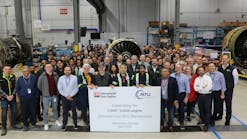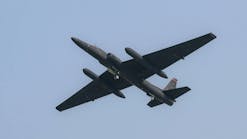VANCOUVER, B.C. Facing pressure from environmentalists concerned about global warming, a trade group representing the airlines of the world set a goal Monday of developing a "zero-emissions" airplane within 50 years.
But Boeing, one of the manufacturers that would have to develop such a plane, wants a more near-term and industrywide approach not one focused solely on airplane technology that is too far off.
"Fifty years is a long time," said Mike Cave, vice president of business strategy for Boeing Commercial Airplanes, at the annual meeting of the International Air Transport Association (IATA) here. "Do we have a vision today for what technology will bring us to a zero-emissions airplane? We don't."
He said the industry should push to become "carbon neutral" with more efficient engines and aerodynamic technology, improved air-trafficcontrol systems, better ground taxiing procedures and to offset any remaining emissions a global carbon-emissions trading system.
"If you sum all those things up, you might be able to get to zero faster than if you just rely on technology on the airplane," Cave said in an interview after his remarks on the conference floor.
Cave also said the growing importance of reducing emissions could impact the next new Boeing airplane to come after the 787 Dreamliner: the 737 replacement jet that's expected to enter service around 2015. Cave leads the group that is studying the development of that jet.
Boeing has done studies on a variety of radical-concept aircraft, including some that trade speed for lower emissions.
Those studies were done as exercises to look far ahead, but could they be applied to the 737 replacement?
"It's too early to tell," said Cave. "We haven't ruled anything out." He said the technology on the next new plane will have to make the current 737s obsolete, both economically and environmentally, and must produce a technological edge that will last for years. "We have to get it right," he said.
The carbon-emissions issue produced an edgy debate in Vancouver after a stirring keynote address by Giovanni Bisignani, chief executive of the IATA, the airlines' trade group. Bisignani called the "zero-emissions" airplane "absolutely achievable."
"Our carbon footprint is growing, and that is not politically acceptable," said Bisignani. "Air transport must become an industry that does not pollute."
The kerosene fuel burned by jets is carbon-based. Carbon dioxide is a so-called greenhouse gas blamed for global warming.
The 260-member trade group wants to prevent the spread of what Bisignani calls a "crisis" in Europe, where politicians are studying new taxes to curb air travel and help pay for mitigating the effect of jet exhaust on the environment.
Solar-powered aircraft and hydrogen fuel-cell technology are "potential building blocks for a carbon-free future," Bisignani said. Manufacturers and airlines should collaborate to build such pollution-free planes, he said.
By 2011, the European Union plans to require airlines to join the region's emissions-trading system that would cap carriers' output of carbon dioxide and other pollutants and force them to buy credits if they went over the limit.
German politicians have appealed for travelers to consider staying closer to home, rather than flying somewhere for vacation.
Some carriers aren't waiting on a new generation of less-polluting jets. Delta and Air Canada are offering passengers the option of paying an extra fee to help offset planes' carbon-dioxide emissions. The money goes to companies that plant trees or invest in other green projects.
And Southwest Airlines, which isn't an IATA member, is introducing new air-traffic navigational systems that cut fuel burn through more direct routings of flights.
Yet many at the Vancouver conference also portrayed the issue as one of perception rather than reality. Airlines now account for only 2 percent of global carbon-dioxide emissions, a share that will grow to 3 percent by 2050 even as air-travel demand rises, according to IATA data.
"While the facts say otherwise, it is clear that the perception is there that we airlines are a major contributor to greenhouse gases," Northwest Airlines CEO Doug Steenland said at Monday's meeting. "Absent new technology, there is a limit to how much we can reduce emissions and continue to serve our customers."
In a panel discussion, Wolfgang Mayrhuber, CEO for German carrier Lufthansa, said that weighing the total carbon emissions from the travel alternatives for a journey from Hamburg to Frankfurt, "from an ecological point of view, you should not take the train. You should fly."
Mayrhuber was appointed Monday to head an IATA task force on environmental issues.
Information from Bloomberg News reporter Susanna Ray is included in this report.
Dominic Gates: 206-464-2963 or [email protected]
Copyright 2005 LexisNexis, a division of Reed Elsevier Inc. All rights reserved.
Terms and Conditions | Privacy Policy
News stories provided by third parties are not edited by "Site Publication" staff. For suggestions and comments, please click the Contact link at the bottom of this page.





